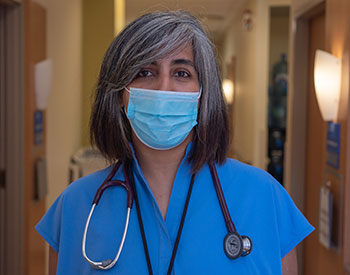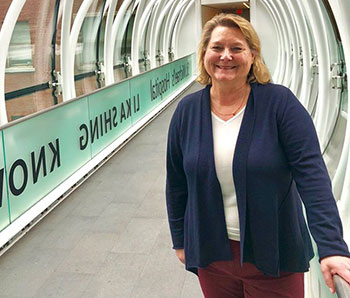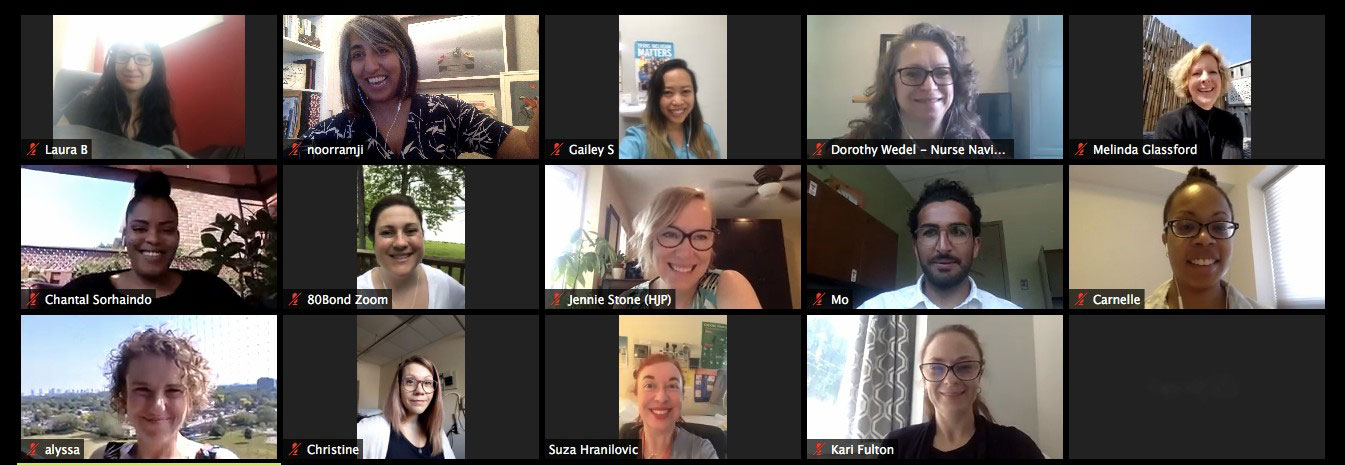How phone calls from Unity Health are improving health during COVID-19

By Christy Janssens

Dr. Noor Ramji is co-lead of the Wellness Check-Ins.
If a person can’t afford fresh fruits and vegetables, their nutrition can suffer.
If a person does not have a phone, their mental health can deteriorate from isolation and loneliness.
When it comes to someone’s well-being, poverty, lack of housing and social supports can have a major impact on a
person’s overall health.
For years, a committee of medical professionals at Unity Health have worked to support patients by developing programs
that improve well-being by addressing these social determinants of health. They formed a Racism and Health committee,
for example, to help address racism within healthcare. They also created a program to assist people struggling with
income security by offering informal credit counselling and help in applying for social benefits and grants.
With COVID-19, the Social Determinants of Health (SDOH) Committee has pivoted to focus on supporting patients through the pandemic.
“We quickly realized that COVID-19 was going to change everything, and those changes to our health-care system would
disproportionately impact people experiencing disadvantage in our community,” said Dr. Ritika Goel, a family physician
with the St. Michaels’ Academic Family Health Team and Inner City Health Associates, a group external from Unity Health.
“We know that social context, including income, employment status, housing status, race, Indigenous status, or gender
identity, collectively, has a larger impact on a person’s health than even the health-care system,” she added. Dr. Goel
is former chair of this SDOH Committee COVID-19 working group.
The group, for example, created an open-access Google Drive led by Carnelle Williams and Laura Boodram, both Income Security Health Promoters. The resources in the drive were created and gathered from many community partners as well as teams within St. Michael’s, including Community and Patient Engagement, Health Justice, Psychology, Social Work, Income Security and The Upstream Lab. Various doctors, nurse practitioners, and others across St. Michael’s were also involved in gathering resources.
It is full of information for staff assisting patients experiencing homelessness, addiction, and violence at home during
COVID-19. It includes an interactive map of resources in Toronto such as open washrooms and showers, food banks,
overdose prevention sites, shelters and COVID-19 Assessment Centres. It provides information about legal support for
immigrants, domestic abuse survivors and tenants experiencing rent issues. It has a folder of pamphlets outlining
specific supports for Indigenous people during COVID-19. It also has information about safe sex work during the pandemic.
“As health-care providers who have unique privileges, we feel it is our role to advocate alongside our patients and community allies,” said Dr. Katie Dorman, family physician in the Department of Family and Community Medicine (DFCM) at St. Michael’s. She is the current SDOH Committee COVID-19 working group chair. “We want to use our collective knowledge and experience to support those who need it.”
The group also supports Wellness Check-Ins. These are proactive phone calls made by an interdisciplinary group of healthcare professionals within St. Michael’s Family Health Team or DFCM to assess the needs of patients. This includes issues of income, safety, and food security.
They ask patients questions like: “Do you have any concerns with obtaining groceries for the next two to three days?” or “Are you having concerns with making ends meet this month?” In urgent situations, they offer material resources, such as sending grocery cards or, in emergency cases, providing used tablets to facilitate virtual connections with healthcare services.
They connect patients to appropriate health services as necessary. If patients without Internet connectivity need to access information that might only be available on the Internet, they are provided that information via phone or mail.
“The patient response to the calls have been overwhelmingly positive,” said Dr. Noor Ramji, Physician in the DFCM and Wellness Check-In Co-lead, “with 98 per cent of patients saying they are highly satisfied or satisfied with the calls.”
The callers are a team of 17 health providers including nurses, nurse practitioners, pharmacists, dieticians,
chiropractors, physiotherapists, chiropodists, social workers, income security promoters, medical residents,
a patient navigator, and
more. They have made over 1000 phone calls to date.

Dr. Deborah Kopansky-Giles is co-lead of the Wellness Check-Ins.
There is also a team of subject matter experts, including psychologists, addictions and health justice support, and income security health promoters who make follow-up calls where needed.
“We hope that the Wellness Check-In calls mitigate the work-load pressure on our front line physicians and nurse practitioners, who are managing both in-person and virtual care on a daily basis,” said Dr. Deborah Kopansky-Giles, Chiropractor at the DFCM and Wellness Check-In co-lead. “The calls provide pre-emptive information, reassurance and connectivity with patients.”
“It is our job to advocate for patients’ health and well-being,” said Dr. Goel. “We can help them access benefits and resources they are entitled to but may not be aware of. We can provide trauma-informed patient care and make sure our clinical spaces are culturally safe. We can also advocate for policy change that meets the needs of our communities through measures such as affordable housing and living wage. This advocacy must happen on multiple levels.”
About St. Michael’s Hospital
St. Michael’s Hospital provides compassionate care to all who enter its doors. The hospital also provides outstanding medical education to future health care professionals in more than 27 academic disciplines. Critical care and trauma, heart disease, neurosurgery, diabetes, cancer care, care of the homeless and global health are among the Hospital’s recognized areas of expertise. Through the Keenan Research Centre and the Li Ka Shing International Healthcare Education Centre, which make up the Li Ka Shing Knowledge Institute, research and education at St. Michael’s Hospital are recognized and make an impact around the world. Founded in 1892, the hospital is fully affiliated with the University of Toronto.
About Unity Health Toronto
Unity Health Toronto, comprised of Providence Healthcare, St. Joseph’s Health Centre and St. Michael’s Hospital, works to advance the health of everyone in our urban communities and beyond. Our health network serves patients, residents and clients across the full spectrum of care, spanning primary care, secondary community care, tertiary and quaternary care services to post-acute through rehabilitation, palliative care and long-term care, while investing in world-class research and education. For more information, visit www.unityhealth.to.

